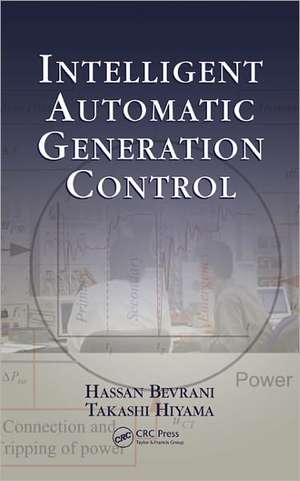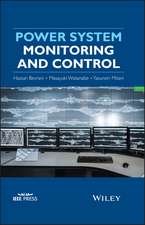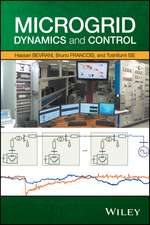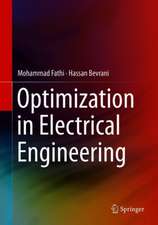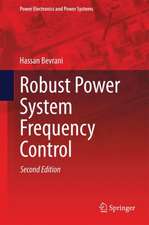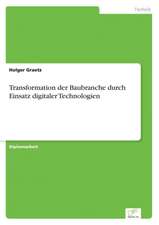Intelligent Automatic Generation Control
Autor Hassan Bevrani, Takashi Hiyamaen Limba Engleză Hardback – 15 apr 2011
Delving into the fundamentals of power system AGC, Intelligent Automatic Generation Control explores ways to make the infrastructures of tomorrow smarter and more flexible. These frameworks must be able to handle complex multi-objective regulation optimization problems, and they must be highly diversified in terms of policies, control strategies, and wide distribution in demand and supply sources—all via an intelligent scheme. The core of such intelligent systems should be based on efficient, adaptable algorithms, advanced information technology, and fast communication devices to ensure that the AGC systems can maintain generation-load balance following serious disturbances.
This book addresses several new schemes using intelligent control techniques for simultaneous minimization of system frequency deviation and tie-line power changes, which is required for successful operation of interconnected power systems. It also concentrates on physical and engineering aspects and examines several developed control strategies using real-time simulations. This reference will prove useful for engineers and operators in power system planning and operation, as well as academic researchers and students in field of electrical engineering.
| Toate formatele și edițiile | Preț | Express |
|---|---|---|
| Paperback (1) | 584.44 lei 6-8 săpt. | |
| CRC Press – 29 mar 2017 | 584.44 lei 6-8 săpt. | |
| Hardback (1) | 1385.39 lei 6-8 săpt. | |
| CRC Press – 15 apr 2011 | 1385.39 lei 6-8 săpt. |
Preț: 1385.39 lei
Preț vechi: 1689.50 lei
-18% Nou
Puncte Express: 2078
Preț estimativ în valută:
265.10€ • 277.48$ • 220.64£
265.10€ • 277.48$ • 220.64£
Carte tipărită la comandă
Livrare economică 31 martie-14 aprilie
Preluare comenzi: 021 569.72.76
Specificații
ISBN-13: 9781439849538
ISBN-10: 1439849536
Pagini: 308
Ilustrații: 150-250 equations; 29 Tables, black and white; 139 Illustrations, black and white
Dimensiuni: 156 x 234 x 23 mm
Greutate: 0.57 kg
Ediția:1
Editura: CRC Press
Colecția CRC Press
Locul publicării:Boca Raton, United States
ISBN-10: 1439849536
Pagini: 308
Ilustrații: 150-250 equations; 29 Tables, black and white; 139 Illustrations, black and white
Dimensiuni: 156 x 234 x 23 mm
Greutate: 0.57 kg
Ediția:1
Editura: CRC Press
Colecția CRC Press
Locul publicării:Boca Raton, United States
Public țintă
Engineers and operators in power system planning and operation; researchers in power system control and operation; undergraduate and postgraduate students in electrical engineering; electric power research institutes and societies.Cuprins
Intelligent Power System Operation and Control: Japan Case Study. Automatic Generation Control (AGC): Fundamentals and Concepts. Intelligent AGC: Past Achievements and New Perspectives. AGC in Restructured Power Systems. Neural-Network-Based AGC Design. AGC Systems Concerning Renewable Energy Sources. AGC Design Using Multiagent Systems. Bayesian-Network-Based AGC Approach. Fuzzy Logic and AGC Systems. Frequency Regulation Using Energy Capacitor System. Application of Genetic Algorithm in AGC Synthesis. Frequency Regulation in Isolated Systems with Dispersed Power Sources.
Notă biografică
H. Bevrani was born in Kurdistan, Iran. He received Ph.D. degree from Osaka University, Osaka, Japan, in 2004, in electrical engineering. From 2004 to 2006, he was a Postdoctoral Fellow at Kumamoto University, Kumamoto, Japan. From 2007 to 2008, he was a Senior Research Fellow at Queensland University of Technology, Brisbane, Australia. From 2000, he has been an academic member of University of Kurdistan. At time of writing this book, he was a professor in Kumamoto University. His special fields of interest include intelligent and robust control applications in Power system and Power electronic industry. Prof. Bevrani is a senior member of Institute of Electrical and Electronics Engineers (IEEE), member of the Institute of Electrical Engineers of Japan (IEEJ) and the Institution of Engineering and Technology (IET).
T. Hiyama was born in Japan on March 14, 1947. He received the B.E., M.S., and Ph.D. degrees all in electrical engineering from Kyoto University, Kyoto, Japan, in 1969, 1971, and 1980, respectively. Since 1989, he has been a Professor in the Department of the Electrical and Computer Engineering, Kumamoto University, Kumamoto, Japan. His current research interests include the application of intelligent systems to power system operation, management, and control. Prof. Hiyama is a senior member of Institute of Electrical and Electronics Engineers (IEEE), a member of the Institute of Electrical Engineers of Japan (IEEJ) and the Japan Solar Energy Society.
T. Hiyama was born in Japan on March 14, 1947. He received the B.E., M.S., and Ph.D. degrees all in electrical engineering from Kyoto University, Kyoto, Japan, in 1969, 1971, and 1980, respectively. Since 1989, he has been a Professor in the Department of the Electrical and Computer Engineering, Kumamoto University, Kumamoto, Japan. His current research interests include the application of intelligent systems to power system operation, management, and control. Prof. Hiyama is a senior member of Institute of Electrical and Electronics Engineers (IEEE), a member of the Institute of Electrical Engineers of Japan (IEEJ) and the Japan Solar Energy Society.
Recenzii
"I enjoyed reading the book and found it informative. It is certainly a book I would recommend to postgraduate students and researchers in the area of intelligent control systems and their application to power system control. My congratulations to the authors."
—Pouyan Pourbeik, IEEE Power and Energy Magazine
—Pouyan Pourbeik, IEEE Power and Energy Magazine
Descriere
With an emphasis on practical methods for computer analysis and design, this book thoroughly explains the basic principles of power system AGC systems. It presents frequency response models, intelligent structures, and mathematical algorithms, which are used to adapt artificial intelligent control techniques for AGC issues. The authors consider physical constraints and engineering aspects of AGC systems and examine most developed intelligent control strategies, using real-time simulations. Rather than describing sophisticated mathematical analytical methods, the text develops appropriate concepts relative to the intelligent AGC problem in real-world power systems.
